Supplier's
Marketplace
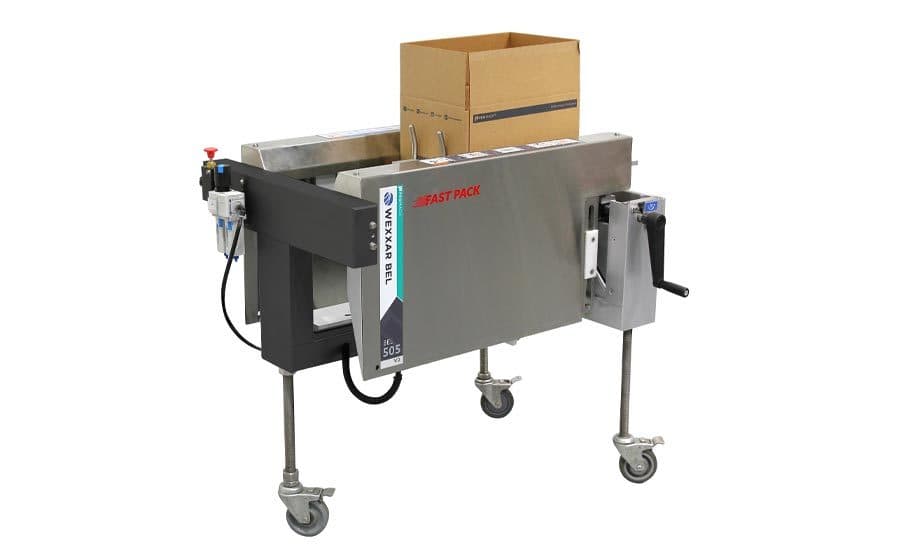
Wexxar BEL 505 V2 Semi-Automatic Case Former
Wexxar Bel, a division of ProMach, released a new iteration of its popular selling BEL 505: the BEL 505 V2. The semi-automatic case former is designed with several new improvements in operational efficiency, including a 27% reduction in air consumption, which significantly reduces the machine’s operating costs, the company says. Attributing to this energy savings is an upgraded pneumatic system with folding mechanisms that are faster, stronger and more reliable, while requiring less air. In addition to the reduction in air consumption, the BEL 505 V2 has a wider case-size range with a minimum width of 5 inches to a maximum width of 16 inches. This improvement provides greater flexibility to the machine as more and more companies are utilizing smaller case sizes. This standard minimum width also reduces the cost to purchase for some applications, which would have required a custom modification to the original model. The new equipment also brings operators fast return on investment through better performance, improved usability and longer machine life. Changeovers have been revamped to be easier and more efficient by removing the locking mechanisms, allowing width changeovers to be performed without having to unlock and relock like with the first model. The BEL 505 V2 also is easier to service as the pneumatic controls, which are operated with a single start / e-stop switch valve, are located at the front as opposed to the bottom of the machine.
Wexxar Bel
13471 Vulcan Way, Richmond, British Columbia V6V 1K4 Canada; 888/565-3219; www.wexxar.com.
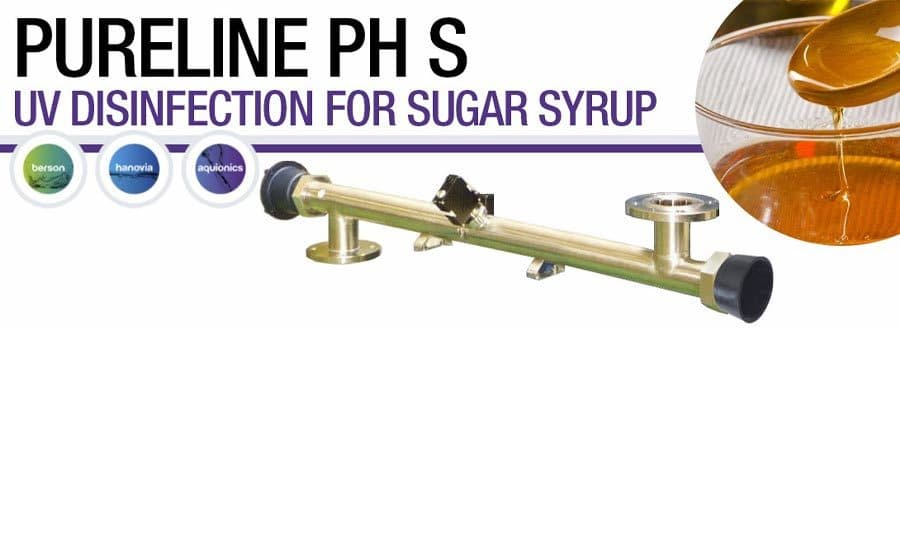
Aquionics Inc.
1455 Jamike Ave., Suite 100; Erlanger, Ky. 41018; 859/341-0710; www.weuvcare.com.
Acquionic inline UV treatment
Aquionic Inc. launched its new UV innovation, which provides a viable solution for eliminating heat-resistant molds and thermotolerant organisms in sweetener solutions. Designed to eliminate spoilage organisms such as lactobacillus, alicyclobacillus and heat-resistant molds that survive pasteurization, the inline UV treatment is directly installed in existing piping or recirculated on sucrose storage tanks, the company says. Among the benefits, beverage producers can leverage the technology to extend product shelf life, eliminate off flavors and odors, and ensure product consistency from batch-to-batch. Traditionally, UV technology had been limited in this application because UV light does not penetrate sweetener solutions as easily as applications commonly seen in ingredient water treatment, according to the company. However, Acquionics’ inline UV innovation utilizes a slender vessel design coupled with unique hydraulics to vigorously mix the product inside of the chamber. This allows the sweetener solution to come into closer contact with the high-intensity UV system lamps, thereby disinfecting difficult-to-inactivate microorganisms. The novel technology also can withstand the higher temperatures commonly seen in sugar syrup applications (up to 176 degrees Fahrenheit), while older technologies were limited to a maximum operating temperature of 104 degrees Fahrenheit. The inactivation of guaiacol-producing alicyclobacillus in sucrose provides beverage-makers new technology for eliminating spoilage organisms from sweetener solutions, it says.
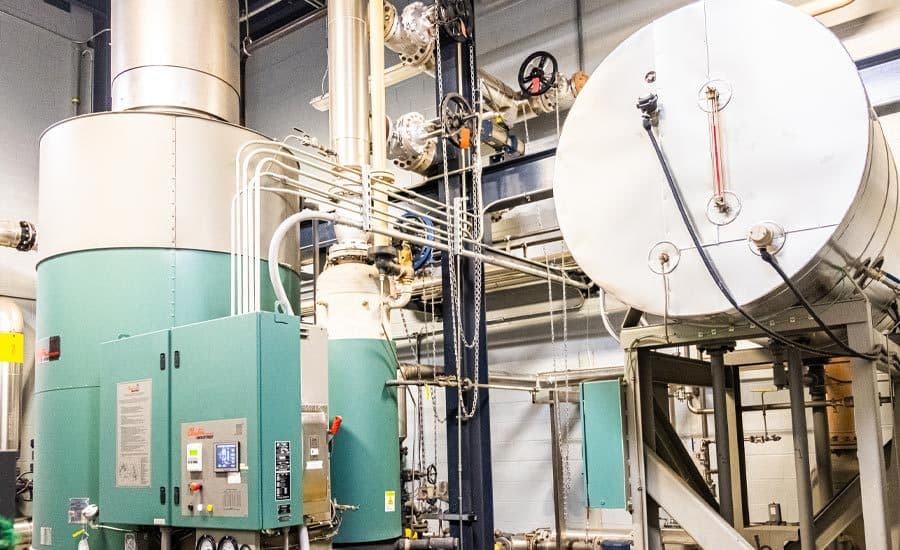
Clayton 500 BHP Steam Generator
Noting that breweries can’t accomplish their goals without the use of steam, Clayton Industries launched its 500 BHP Steam Generator and feedwater skid. Comprised of three critical components — a positive displacement pump, a helical steel coil heat exchanger and a mechanical steam separator — the compact generator delivers four key advantages for companies in the beverage industry, the company says. These include fuel efficiency as the pump and coil create a counterflow heat exchanger that is more fuel efficient than a traditional boiler, the company says. Meanwhile, dry steam from the mechanical steam separator guarantees 99.5% dry steam, enabling beverage-makers better control process temperatures. Fast response also is an advantage so that the generator can go from cold stand-by to full output in less than 10 minutes, which is ideal for batch processing, it notes. Additionally, unlike traditional firetube boilers, the generator’s inherent design eliminates the possibility of a steam explosion. The company also can provide a completely skid-mounted system with all boiler room components pre-mounted, plumbed and wired so it can be used in brewing, distilling, pasteurizing, clean-in-place, for hot-fill lines, and bottling by beverage companies worldwide.
Clayton Industries
17477 Hurley St., City of Industry, Calif. 91744; 800/423-4585; www.claytonindustries.com.
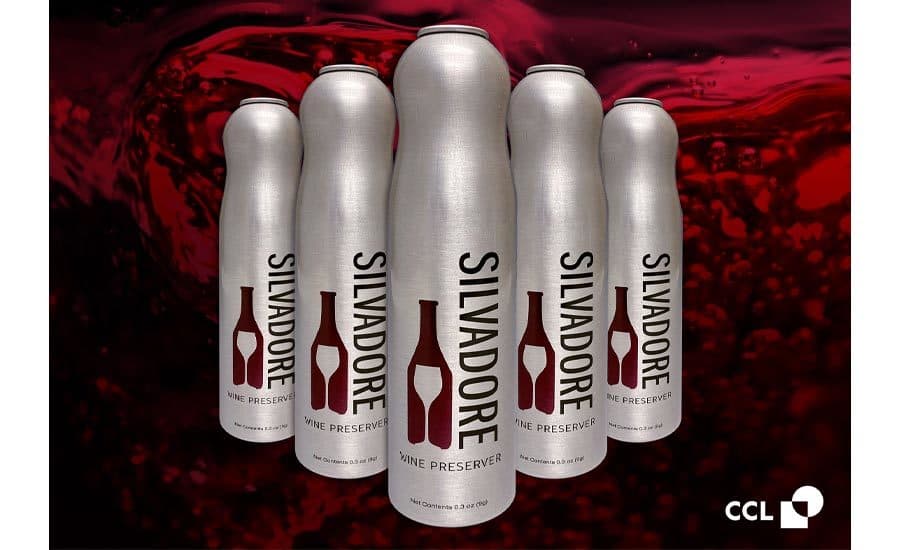
CCL Container
1 Llodio Drive, Hermitage, Pa. 16148; 724/981-4420; www.cclcontainer.com.
CCL aluminum aerosol containers
CCL Container, a division of CCL Industries, announced the release of sleek, aerosol containers that provide a simple, cost-effective wine preservation process that eliminates virtually all product spoilage. In partnership with Silvadore Wine Essentials, CCL Container’s recyclable aluminum packaging preserves the wine’s flavor and integrity, long after the bottle is opened, the company says. The packaging also prevents the open bottle of wine from turning sour before it can be fully consumed. The product utilizes food-grade argon gas as a preservation agent. By dispensing two sprays from the container’s press-top actuator into an open wine bottle, the argon gas rests on top of the remaining wine, functioning as a barrier that prevents oxidation. The colorless, tasteless barrier maintains the wine’s original freshness and flavor structure for up to two weeks after initial uncorking. The aerosol bottle holds 0.3 ounces of argon gas, which is enough for approximately 50 uses, the company says. The sleek, contoured brush neck allows for improved grip and handling, while the high-end decorating gives the containers a premium look and feel that catches the eye. Additionally, the 100% lightweight virgin aluminum container is fully recyclable and available for use outdoors and on-the-go consumption.
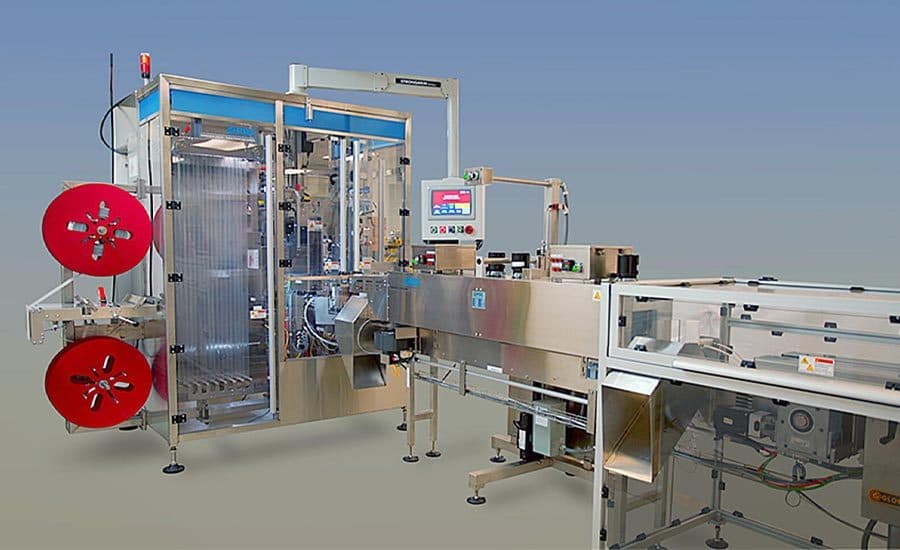
PDC StackAlign Multipack Sleever
To provide companies with a multitude of stacking solutions, PDC International Corp. introduced its new StackAlign Stacking and Sleeving Multipacker system. The proprietary system allows a number of individual units to be grouped, or multipacked, by stacking and shrink sleeving them, the company says. The StackAlign system takes individual products from an infeed conveyor, counts and stacks them, placing them onto fixed pedestals on a servo-controlled indexing conveyor. The product stacks are then centered and aligned prior to sleeve application. A dual zone hot air tunnel provides a smooth tightly fitting finish. The system is ideal for consumer or industrial products that stack flat on top of one another. Capable of running 200 parts a minute, stacks can be made from two to 10 products depending on package height. The shrink sleeve can underlap and overlap the stack of products, grouping them securely for either distribution or shipping directly to the store shelves, the company says. The StackAligner works by using servo-controlled rollers to meter individual parts onto an elevator while counting and stacking. Two servo-controlled elevators work successively to create stacks to maximize throughput. Prior to arrival at the elevator, individual parts are inspected by sensors to identify non-conforming units. Those that pass inspection continue on, while failed units are purged from the system. The elevator system requires no mechanical change parts to switch between pack sizes because changes are made electronically through stored recipes on the HMI. The sleeve is applied by one of PDC’s mandrel style R-Series sleeve applicators and then the sleeve is tamped down to confirm the film is correctly located on the stack. Sensors confirm the sleeve is in the proper position before entering the dual zone shrink tunnel. In the final step, a pair of hugger belts discharges the stacks, which can be adjusted to meet pack out needs.
PDC International Corp.
8 Sheehan Ave., Norwalk, Conn. 06854; 203/853-1516; www.pdc-corp.com.
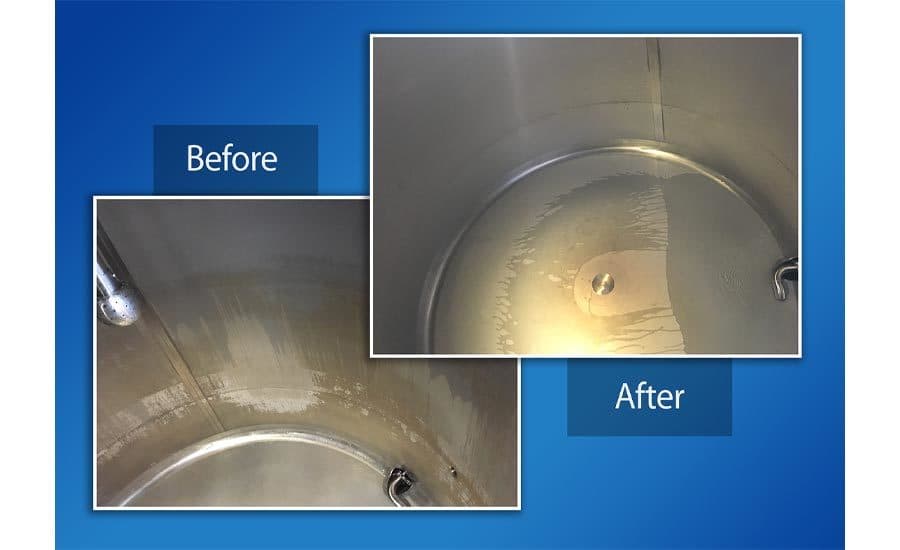
Madison Chemical
3141 Clifty Drive, Madison, Ind. 47250; 812/273-6000; www.madchem.com.
MadBrew STONE ACID
Madison Chemical introduced MadBrew STONE ACID, a specially inhibited low foam acid blend designed to remove hard water deposits and scale, extract from wort, lipids from hop compounds and more. The low foaming acid blend dissolves the crystalline structure of the calcium carbonate, which permits the complete removal of the deposits from kettles, heat exchangers and other equipment, the company says. Ideal for stainless steel and copper alloys, the formulation is recommended for use prior to Enviro-Clean BOIL-OUT on hot side brew house cleaning applications, and in advance of Enviro-Clean BOIL OUT on heat exchangers. STONE ACID is ideal for craft breweries of all sizes and volumes, as well as food and beverage plants where hard water deposits and scale are problematic. An A3 compound, the formulation is safe for use throughout every department in a beverage plant and customers typical “dial in” on final concentrations after several trials and cleanings, the company says.
Waterloo, Ontario-based Descartes Systems Group acquired GreenMile, Orlando, Fla. Used by some of the world’s largest food and beverage companies, GreenMile’s scalable mobile route execution solutions digitize final-mile delivery processes and eliminate manual paper processes from the supply chain. This, in turn, improves productivity, increases efficiencies and provides real-time delivery visibility to enhance customer service, the company says. By combining GreenMile's solution with Descartes’ advanced route optimization technology, distributors can improve their final-mile operations and the challenges that come with it, as well as leverage advanced analytics and delivery performance management tools that provide a comprehensive view of field operations, the companies say. Descartes purchased GreenMile for up-front cash of $30 million.
Larry Lanham, founder and CEO of Polymer Packaging, Massillon, Ohio, was named an Entrepreneur Of The Year 2021 East Central Award finalist by Ernst & Young LLP. Lanham founded Polymer Packaging in 1986 as a marketing and distribution organization. The company has since grown into a state-of-the-art manufacturing organization providing engineered flexible packaging solutions with three divisions in Ohio and Michigan and three affiliate-owned plants in Cincinnati and Charlotte, N.C. Award winners were announced Aug. 5 during a special virtual celebration.
A new nonprofit, The Next Generation in Trucking Association announced new school partnerships to provide CDL Driver and Diesel Technician programs for young adults in Kentucky, Wisconsin and California. The group was started by leaders in the trucking industry to engage the next generation of trucking industry professionals by partnering with public and private schools and community/technical colleges to offer training opportunities that eventually will lead to jobs. According to a recent estimate, driver shortage is expected to grow to more than 174,000 by 2026. An aging fleet of drivers is one of the main reasons for the shortage. The Bureau of Labor Statistics estimates that the average age of a commercial truck driver in the United States is 55 years old. The average age of a driver entering CDL school is almost 35.
Avery Dennison Corp., Glendale, Calif., announced that it has become a member of the Forest Stewardship Council (FSC), Minneapolis, signaling the company’s desire to reinforce its commitments to paper procurement that helps protect and preserve the world’s forests and the habitats and ecosystems they support. In a statement, Nicoletta Baratta, senior global product line manager for Core Solution in Avery Dennison’s Retail Branding & Information Solutions said: “Globally, we set ambitious 2025 goals to achieve 100% certified paper and 70% FSC-certified face paper, which we use for our pressure sensitive label products, for our products portfolio. At the end of 2020, we achieved 92% certified paper and 83% certified face paper use, putting us well on the way to meet our goals and support FSC in its mission.”
Lake Forest, Calif.-based Toshiba America Business Solutions announced that President and CEO Scott Maccabe retired June 30 and is succeeded by Larry White, who previously served as chief operating officer (COO). Maccabe holds the distinction of concurrently serving as president and CEO of both Toshiba America Business Solutions and Toshiba Global Commerce Solutions for more than five years (August 2015 through November 2020). He successfully grew Toshiba Global Commerce Solutions into a global leader in retail store technology, the company said. Maccabe will serve as an advisor to Toshiba America Business Solutions' parent company, Toshiba Tec Corporation.

Cincinnati-based Single Phase Power Solutions (SPPS) partnered with North Carolina Electric Cooperatives to provide proven, reliable, three-phase power solutions to rural areas where it is not available, and/or cost prohibitive to bring in. The manufacturer of the 1-to-3 Power Source features a BELLE Motor using Written-Pole technology to deliver three-phase power from single-phase utility service. SPPS’ approach eliminates the high fuel and maintenance costs, and the pollution of fossil-fuel-powered Gen-Sets, while delivering superior power quality to that of a conventional phase converter, it says. Available in 50, 75 and 100 HP configurations, the 1-to-3 Power Source is ideal for a broad range of industries and applications services.
September 2021 | bevindustry.com
